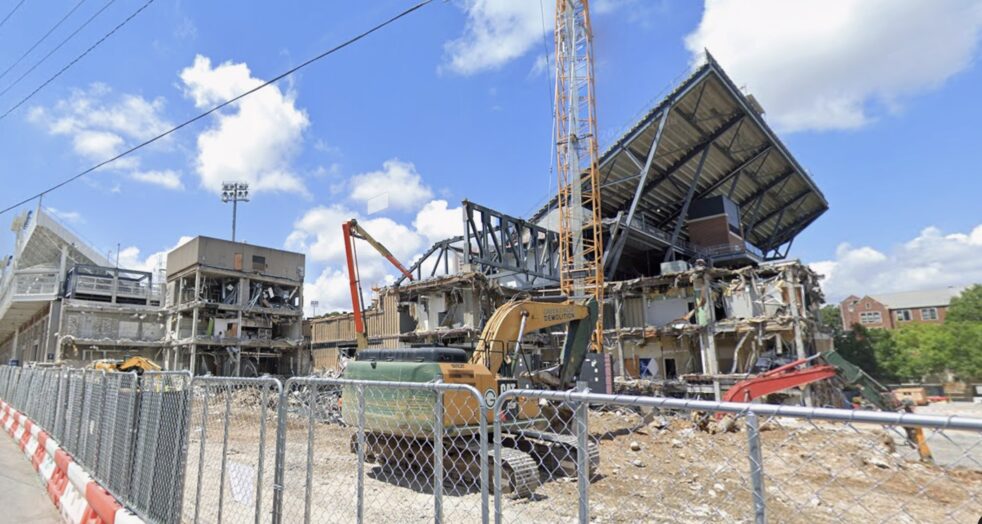Tech released its Comprehensive Campus Plan spanning 2023-2031 in November of 2023. The plan outlined over 20 projects to facilitate the Institute’s 10-year Strategic Plan. These projects are meant to reshape the campus, develop new infrastructure and inspire the campus and surrounding community, and they are already starting to be put in place.
The School of Public Policy building D.M. Smith is receiving major upgrades, with the installation of new electrical and plumbing systems, as well as accommodations for an elevator and wheelchair accessibility. The building will have a virtual lab and space for hoteling for the School. The building once relied on steam for daily operations, but with these new additions, the building will align with the goals of the Georgia Tech Climate Action Plan.
Ferst Drive, a road encircling the campus, is being revitalized to accommodate bicycle and scooter usage. There will be more separation for pedestrians, bikes, buses, and vehicles to provide more safety. This includes a cycle track installation along the interior of the road as well as realignment with other routes to improve traffic circulation.
In July of 2024, many buildings around campus lost air conditioning due to a chilled water pipe leak in Harrison Square. In addition to repairing the pipe, Infrastructure and Sustainability is currently working to increase the resiliency of the overall system.
The Thomas A. Fanning Student-Athlete Performance Center will be a 100,000-square-foot 4-story student-athlete center. It will provide strength and conditioning space, sports medicine offices, nutrition areas, and much more to support the work of Tech’s athletes. As a result, the southbound lane of Techwood Drive will not reopen until the completion of the center in 2026.
Tech Square Phase 3 will welcome Scheller Tower, a 14-story, 415,000-square-foot academic and office space housing multiple programs for the Scheller College of Business. The H. Milton Stewart School of Industrial and Systems Engineering will occupy the 18-story George tower and include street-level retail.
The new Curran Street Residence Hall, set to be complete in 2026, will be the first new residence hall on campus since 2005. The residence hall will house 860 first-year students across 191,000 square feet of double occupancy rooms.
The Pathway of Progress; Celebrating Georgia Tech Women is an exterior landscape sculptural and digital experience, commemorating women and historically momentous events that have shaped the Institute. The project will be open to the public by the end of Fall 2024 with an official grand opening in March 2025. There is an interactive tool that allows users to see current and almost-completed projects, found on https://gtfacilities.maps.arcgis.com/apps/instant/slider/index.html?appid=60287828a9b94c63bb5b904612b327dd.
The Infrastructure and Sustainability (I&S) Analytics team also has a data request form for anyone—students, faculty, researchers, and community members—who is interested in getting more information about specific campus data and encourages students to use the campus as inspiration for class assignments, research projects, or design projects.
When asked about the significance of the changes the Plan will make to the campus, Institute Planner Laurence Brennan notes, “We feel a profound responsibility to inspire and engage students within our built environment.” He hopes “that our work transcends the borders of Georgia Tech by weaving the urban fabric that surrounds us into campus.”
With the increasing numbers of students and campus visitors the Institute receives each year, the campus can face traffic problems with the variety of mobility. Infrastructure and Sustainability is working hard to address this with the reconfiguration of roads around campus, such as the addition of bike lanes on Ferst Drive and Techwood Drive.
“The Techwood project aligns directly with the city’s plans to connect the campus to Centennial Olympic Park, where essentially all bike routes converge and disperse across the greater metro area,” Brennan adds. “These larger scale connections promote more walk-and-bikeability throughout the city and encourage more positive interactions regarding motor vehicles.”
When asked about the impact on day-to-day lives the current projects will have, I&S Communications Officer Cathy Brim emphasized, “All of these projects support our mission of providing a resilient learning environment and the safest campus possible for students, faculty, and staff.”
Georgia Tech celebrates alumni of diverse backgrounds through inclusion initiatives such as the Pathway of Progress and the Divine Nine Plaza, to “demonstrate the power that diversity of thought has in higher education.” These projects are more than upgrading the physical aspects of campus — they are meant to inspire students and help them feel that they belong at Georgia Tech.
Infrastructure and Sustainability welcomes the Georgia Tech community to be involved. The Student Government Association and Graduate Student Government Association host town hall events, volunteer events, and send out surveys across the campus to receive feedback. Further information about these projects can be found on the I&S website https://facilities.gatech.edu/projects/current, around campus on digital screens in multiple locations, and on Georgia Tech social media accounts.
